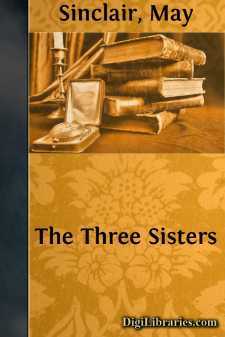Categories
- Antiques & Collectibles 13
- Architecture 36
- Art 48
- Bibles 22
- Biography & Autobiography 813
- Body, Mind & Spirit 142
- Business & Economics 28
- Children's Books 17
- Children's Fiction 14
- Computers 4
- Cooking 94
- Crafts & Hobbies 4
- Drama 346
- Education 46
- Family & Relationships 57
- Fiction 11829
- Games 19
- Gardening 17
- Health & Fitness 34
- History 1377
- House & Home 1
- Humor 147
- Juvenile Fiction 1873
- Juvenile Nonfiction 202
- Language Arts & Disciplines 88
- Law 16
- Literary Collections 686
- Literary Criticism 179
- Mathematics 13
- Medical 41
- Music 40
- Nature 179
- Non-Classifiable 1768
- Performing Arts 7
- Periodicals 1453
- Philosophy 64
- Photography 2
- Poetry 896
- Political Science 203
- Psychology 42
- Reference 154
- Religion 513
- Science 126
- Self-Help 84
- Social Science 81
- Sports & Recreation 34
- Study Aids 3
- Technology & Engineering 59
- Transportation 23
- Travel 463
- True Crime 29
The Combined Maze
by: May Sinclair
Description:
Excerpt
You may say that there was something wrong somewhere, some mistake, from the very beginning, in his parentage, in the time and place and manner of his birth. It was in the early eighties, over a shabby chemist's shop in Wandsworth High Street, and it came of the union of Fulleymore Ransome, a little, middle-aged chemist, weedy, parched, furtively inebriate, and his wife Emma, the daughter of John Randall, a draper.
They called him John Randall Fulleymore Ransome, and Ranny for short.
Ranny should have been born in lands of adventure, under the green light of a virgin forest, or on some illimitable prairie; he should have sailed with the vikings or fought with Cromwell's Ironsides; or, better still, he should have run, half-naked, splendidly pagan, bearing the torch of Marathon.
And yet he bore his torch.
From the very first his mother said that Ranny was that venturesome. He showed it in his ill-considered and ungovernable determination to be born, and it was hard to say which of them, Ranny or his mother, more nearly died of it. She must have been aware that there was a hitch somewhere; for, referring again and again, as she did, to Ranny's venturesomeness, she would say, "It beats me where he gets it from."
He may have got some of it from her, for she, poor thing, had sunk, adventurously, in one disastrous marriage her whole stock of youth and gaiety and charm. It was Ranny's youth and charm and gaiety that made him so surprising and so unaccountable.
Circumstances were not encouraging to Ranny's youth, nor to his private and particular ambition, the cultivation of a superb physique. For, not only was he a little chemist's son, he was a great furniture dealer's inexpensive and utterly insignificant clerk, one of a dozen confined in a long mahogany pen where they sat at long mahogany desks, upon high mahogany stools, making invoices of chairs and tables and wardrobes and washstands and all manner of furniture. You would never have known, to see him sitting there, that John Randall Fulleymore Ransome was a leader in Section I of the London Polytechnic Gymnasium.
So far, in his way, he testified, he bore his torch. Confined as he was in a mahogany pen, born and brought up in the odor of drugs, and surrounded by every ignominious sign of disease and infirmity, his dream was yet of cleanness, of health, and the splendor of physical perfection. The thing that young Ransome most loathed and abhorred was Flabbiness, next to Flabbiness, Weediness. The years of his adolescence were one long struggle and battle against these two. He had them ever before him, and associated them, absurdly but inveterately, with a pharmaceutical chemist's occupation; of Weediness his father being the prime example; while for Flabbiness, young Mercier, his father's assistant—well, Mercier, as he said, "took the biscuit." It was horrible for young Ransome to inhabit the same house with young Mercier, because of his flabbiness.
In all cities there are many thousand Ransomes, more or less confined in mahogany cages, but John Randall Fulleymore stands for all of them. He was one of those who, in a cold twilight on a Saturday afternoon, stagger from the trampled field, hot-eyed under their wild hair, whose garments are stained from the torn grass and uptrodden earth, with here and there a rent and the white gleam of a shoulder or a thigh; whose vivid, virile odor has a tang of earth in it....












